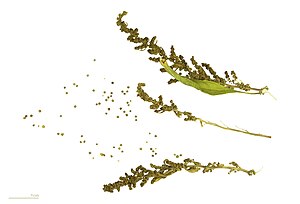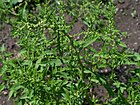Note: This is a project under development. The articles on this wiki are just being initiated and broadly incomplete. You can Help creating new pages.
Dysphania ambrosioides - Epazote
Epazote is an annual or short-lived perennial herb. It is native to Central America, South America, and southern Mexico.
Contents
- 1 Uses
- 2 Parts Used
- 3 Chemical Composition
- 4 Common names
- 5 Properties
- 6 Habit
- 7 Identification
- 8 List of Ayurvedic medicine in which the herb is used
- 9 Where to get the saplings
- 10 Mode of Propagation
- 11 How to plant/cultivate
- 12 Commonly seen growing in areas
- 13 Photo Gallery
- 14 References
- 15 External Links
Uses
Helminthic infestation, Indigestion, Cramps, Ulcers, Asthma, Intestinal worms, Folic, Diarrhea, Sore throats.[1]
Parts Used
Chemical Composition
Alpha-pinene, aritasone, ascaridole, butyric-acid, d-camphor, essential oils, ferulic-acid, geraniol[3]
Common names
| Language | Common name |
|---|---|
| Kannada | ಕಾಡುಓಮ Kaadu oma, ಗುಡ್ಡೆಓಮ Gudde oma |
| Hindi | Sugandha vastuka |
| Malayalam | Eechchekkolli, Kattayamodakam |
| Tamil | |
| Telugu | |
| Marathi | Chandanbatva |
| Gujarathi | NA |
| Punjabi | NA |
| Kashmiri | NA |
| Sanskrit | |
| English | American wormseed, Jerusalem-tea |
Properties
Reference: Dravya - Substance, Rasa - Taste, Guna - Qualities, Veerya - Potency, Vipaka - Post-digesion effect, Karma - Pharmacological activity, Prabhava - Therepeutics.
Dravya
Rasa
Guna
Veerya
Vipaka
Karma
Prabhava
Habit
Identification
Leaf
| Kind | Shape | Feature |
|---|---|---|
| Simple | Oblong | The leaves are divided into 3-6 toothed leaflets, with smaller leaflets in between |
Flower
| Type | Size | Color and composition | Stamen | More information |
|---|---|---|---|---|
| Unisexual | 2-4cm long | Yellow | 5-10 | Flowers Season is June - August |
Fruit
| Type | Size | Mass | Appearance | Seeds | More information |
|---|---|---|---|---|---|
| Simple | 7–10 mm (0.28–0.4 in.) long pome | Clearly grooved lengthwise, Lowest hooked hairs aligned towards crown | With hooked hairs | Fruiting season is August - April |
Other features
List of Ayurvedic medicine in which the herb is used
- Vishatinduka Taila as root juice extract
Where to get the saplings
Mode of Propagation
How to plant/cultivate
Epazote grows best in full sun in a warm tropical climate. Grows in cultivated garden beds.[5]
Commonly seen growing in areas
Tall grasslands, Meadows, Borders of forests and fields.
Photo Gallery
References
- ↑ Cite error: Invalid
<ref>tag; no text was provided for refs namedUses - ↑ "Karnataka Medicinal Plants Volume - 2" by Dr.M. R. Gurudeva, Page No.764, Published by Divyachandra Prakashana, #45, Paapannana Tota, 1st Main road, Basaveshwara Nagara, Bengaluru.
- ↑ Plant chemicals
- ↑ Common names
- ↑ Cultivation and harvesting
External Links
- Pages using duplicate arguments in template calls
- Pages with reference errors
- Ayurvedic Herbs known to be helpful to treat Helminthic infestation
- Ayurvedic Herbs known to be helpful to treat Indigestion
- Ayurvedic Herbs known to be helpful to treat Cramps
- Ayurvedic Herbs known to be helpful to treat Ulcers
- Ayurvedic Herbs known to be helpful to treat Asthma
- Ayurvedic Herbs known to be helpful to treat Intestinal worms
- Ayurvedic Herbs known to be helpful to treat Folic
- Ayurvedic Herbs known to be helpful to treat Diarrhea
- Ayurvedic Herbs known to be helpful to treat Sore throats
- Herbs with Leaf used in medicine
- Herbs with Extracted Oil used in medicine
- Herbs with common name in Kannada
- Herbs with common name in Hindi
- Herbs with common name in Malayalam
- Herbs with common name in Marathi
- Herbs with common name in English
- Habit - Herb
- Index of Plants which can be propagated by Seeds
- Index of Plants which can be propagated by Cuttings
- Herbs that are commonly seen in the region of Tall grasslands
- Herbs that are commonly seen in the region of Meadows
- Herbs that are commonly seen in the region of Borders of forests and fields
- Herbs
- Amaranthaceae









